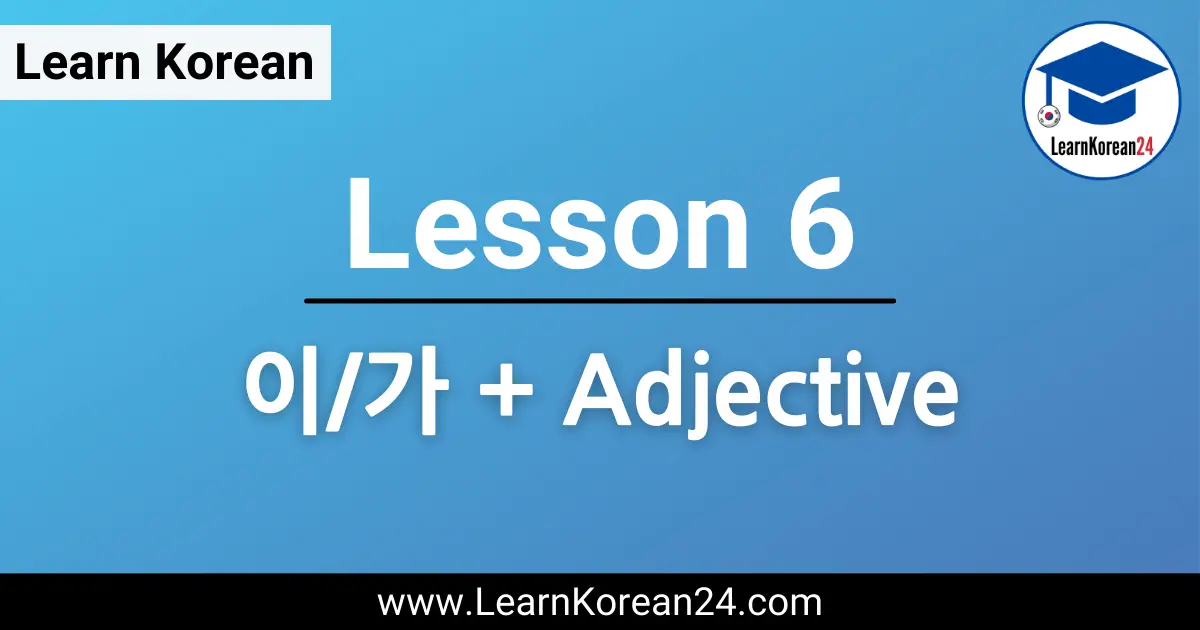Lesson 6: 이/가 + Adjective
In this lesson, we will take another look at the subject marking particle 이/가 that we covered in lesson 2. There are two main uses of this particle: to mark a noun in a sentence as the person or thing doing the verb or to mark a noun as the person or thing being described by an adjective.
In this lesson, you will learn the second usage. That is, you will learn how to use the particle 이/가 together with adjectives to say things like “The weather is good.”, “Coffee is delicious.“, etc. If you need to review the usage of 이/가 with verbs, check out lesson 2.
Lesson 6:
이/가 + Adjective
KEY INFORMATION
이/가 [i/ga] = Subject Marking Particle
Conjugation 1: Noun ending in a consonant + 이
Conjugation 2: Noun ending in a vowel + 가
Beginner Korean learners often have difficulty identifying the subject of a sentence, but once you get used to it, it’s quite easy. Take a look at the following examples. Can you identify the subject in each sentence?
The apple is delicious.
The weather is good.
The book is interesting.
The subjects in these sentences are ‘apple, ‘weather’, and ‘book’. But how can you tell? Well, the subject is the thing being described by the adjective. So the apple is being described as delicious, the weather is being described as good and the book is being described as interesting. When making these sentences in Korean, we use 이/가 to mark the subject in the sentence.
사과가 맛있어요. [sa-gwa-ga ma-si-sseo-yo] = The apple is delicious.
날씨가 좋아요. [nal-ssi-ga jo-a-yo] = The weather is good.
책이 재미있어요. [chae-gi jae-mi-i-sseo-yo] = The book is interesting.
이/가 Conjugation Rule
When attaching 이 or 가 to a noun, you must choose the correct one. The one you choose depends on whether the preceding noun ends in a consonant or a vowel. See the table below.
| Conjugation Rule | Examples |
|---|---|
| Noun Ending In Consonant + 이 | 책이 (book) 가방이 (bag) |
| Noun Ending In Vowel + 가 | 날씨가 (weather) 커피가 (coffee) |
Example Sentences
To review, here are some example sentences using the structure 이/가 + Adjective. If you want to try and make your own sentences, check out this list of Korean adjectives and our Korean vocabulary lists to find some words you can use in these sentences.
옷이 작아요. [o-si ja-ga-yo] = The clothes are small.
가방이 싸요. [ga-bang-i ssa-yo] = The bag is cheap.
모자가 비싸요. [mo-ja-ga bi-ssa-yo] = The hat is expensive.
날씨가 좋아요. [nal-ssi-ga jo-a-yo] = The weather is good.
책이 재미있어요. [chae-gi jae-mi-i-sseo-yo] = The book is interesting.
커피가 맛있어요. [keo-pi-ga ma-si-sseo-yo] = Coffee is delicious.

